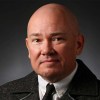Over the past year, many of us eventually adapted to working from home. What happens, though, when your job is being an elite athlete? We reached out to five of the valley’s top competitors to see how the pandemic altered their training schedules and careers. From creativity to heartbreak to finding family members to lean on, this is how they endured.
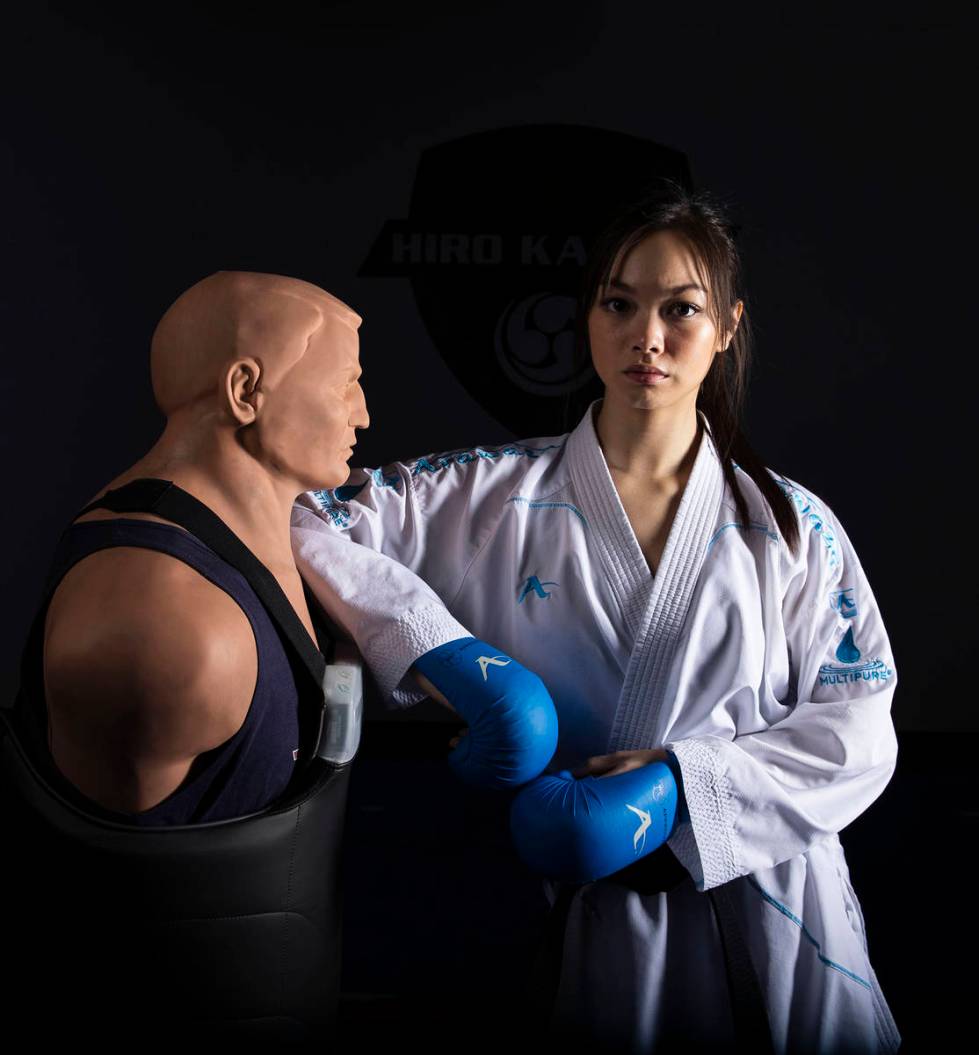
Dream of Olympics delayed, but karate star was never deterred
Trinity Allen has been training for this moment since she was 4, even though she couldn’t have known it at the time.
As a member of the U.S. senior national karate team, the 20-year-old UNLV student was among the first wave of athletes preparing for the Olympic qualifiers — karate being one of five sports added for the 2020 Games — when COVID hit.
“At first, I was kind of like, ‘Oh, I get some rest. I get a little time off,’ ’’ she recalls. Disappointment began setting in as more and more competitions were canceled.
After taking a month or so to clear her head, Allen was back in the family dojo, focusing on her technique and journaling while counting her blessings. “I was lucky to have a dojo still available,” she admits. “I know a lot of people didn’t have that.”
Just as the Olympics were delayed, so was the qualifying tournament. But her dream of being among the first to compete in that global arena never wavered.
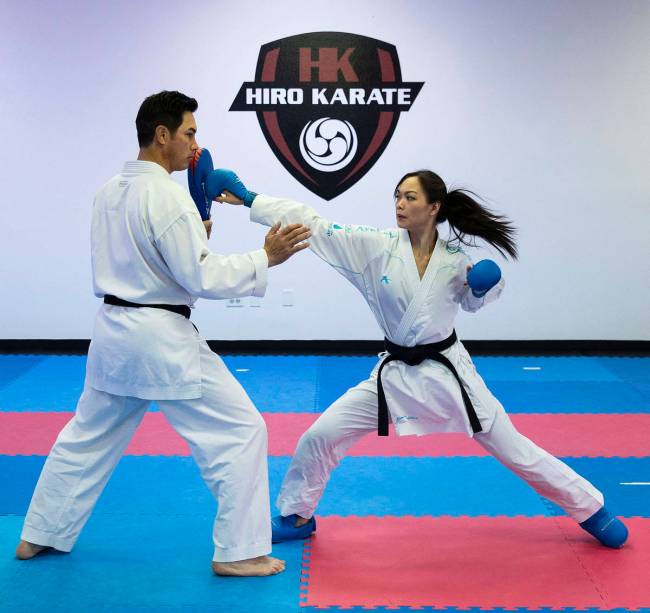
“Sometimes it doesn’t even hit me to think how crazy this opportunity is or how rare this is,” Allen says. “I always think about how so many people wished they had this opportun- ity, and they fought for this.”
Those include her father and coach, Hiroshi Allen, who was a member of the U.S. national karate team in the 1990s when it first began competing in the Pan American Games, and his father, Bob Allen, who captained the team in the 1970s.
In addition to the missed competitions, Allen lost about nine months of sparring time until she was able to restart in December. She shook off some of the rust at a tournament in Marseille, France, this April. Then, facing a shortage of world-class training partners, in May she set off for a six-week program at a training center in the mountains outside Almaty, Kazakhstan. “It’s just eat, sleep, karate. Repeat. Repeat,” she says, from halfway around the world.
Hiroshi Allen has been with her in the dojo since she began this journey, 16 years ago.
“I wish I had a tenth of her work ethic when I was a competitor,” he admits.
For her part, Allen isn’t sure she could’ve gotten through the past year without him.
“I think the main thing was just keeping me in check and keeping me accountable,” she says. “I don’t know, if I didn’t have him, if I’d be able to stay motivated. I think it would be really easy to just kind of relax or feel really down. You know, I still did, but I had someone to lift me up, support me, keep me going and push me through the difficulties from COVID.”
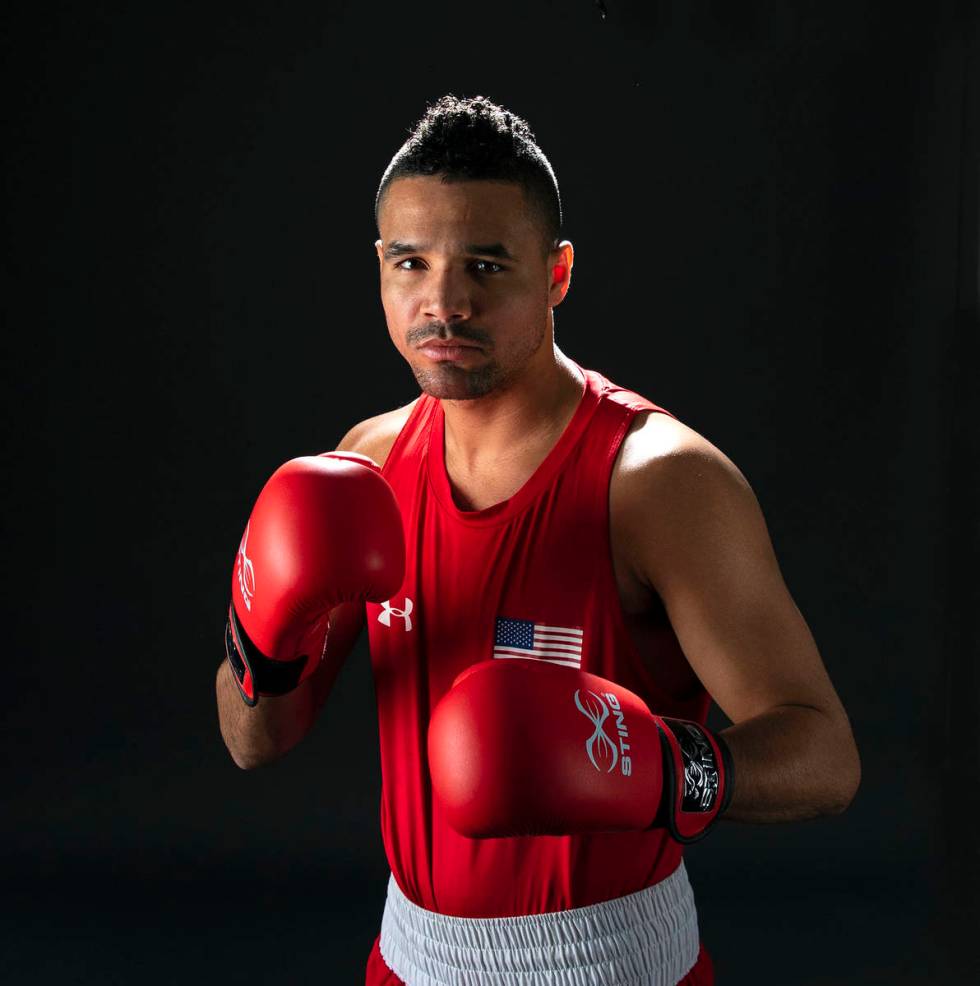
KO’d by COVID - Pandemic cost local light heavyweight a shot at Team USA
The pandemic hit Rahim Gonzales like a haymaker.
An alternate in 2016, the light heavyweight boxer spent four years training for a spot on Team USA in Tokyo — then added a fifth when the Olympics were delayed.
“It was kind of hard because I was scared to just even get next to somebody,” Gonzales says of his modified approach to training.
Even fighters with the longest reaches can’t spar from 6 feet apart, so he focused on shadowboxing and conditioning work. In the early days of COVID-19, most of the boxing gyms were closed. Even if they’d been open, they tend to be small, tightly clustered rooms. He and his father, Saalim Raoof, took to training outdoors, mostly in Majestic Park, north of Summerlin.
Gonzales was recalled to Colorado Springs, Colorado, home of the U.S. Olympic & Paralympic Training Center, in mid-June last year. The center remained closed, so USA Boxing holed up at the nearby Hotel Elegante and trained in its ballrooms. Even when the Team USA facility reopened, Gonzales and his fellow boxers weren’t allowed to return because of the contact involved in their sport.
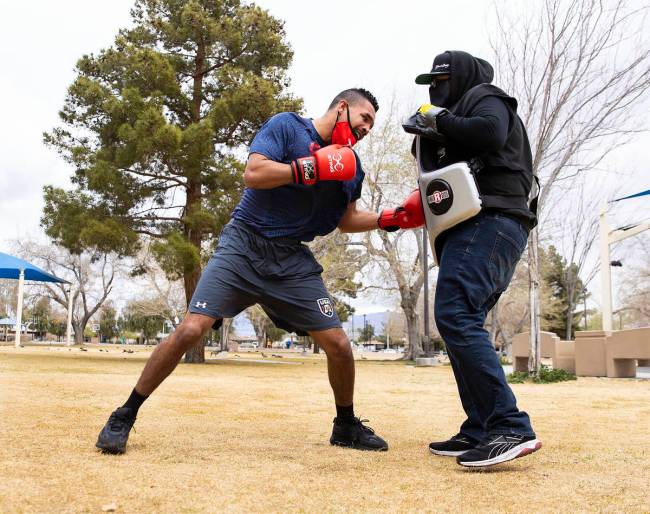
At one point, the team took over an abandoned Macy’s.
“It was nice,” the 25-year-old says of their mall digs. “They put in rings, bags and a weight room.”
What they didn’t put in was heat, so when that Macy’s got too cold, the team moved to Chula Vista, California.
COVID-19 caught up with Gonzales in early January, and it remained in his system for two months.
“I had no strength. It was crazy,” he says. “This whole year’s been rough.”
The biggest blow was yet to come.
In May, he learned the Olympic qualifying tournament in Argentina had been canceled for the second year in a row. Boxers would be chosen based on their international rankings, and Gonzales wasn’t among the six U.S. fighters who made the cut.
“I was upset,” he admits, “because I didn’t even have the opportunity to even try.”
“The pandemic just didn’t stop me,” Gonzales says. “It stopped the whole world.”
He rattles off a list of people — those who lost jobs, family members or their own lives — who had it worse than him.
“I have to take into consideration it wasn’t just me.”
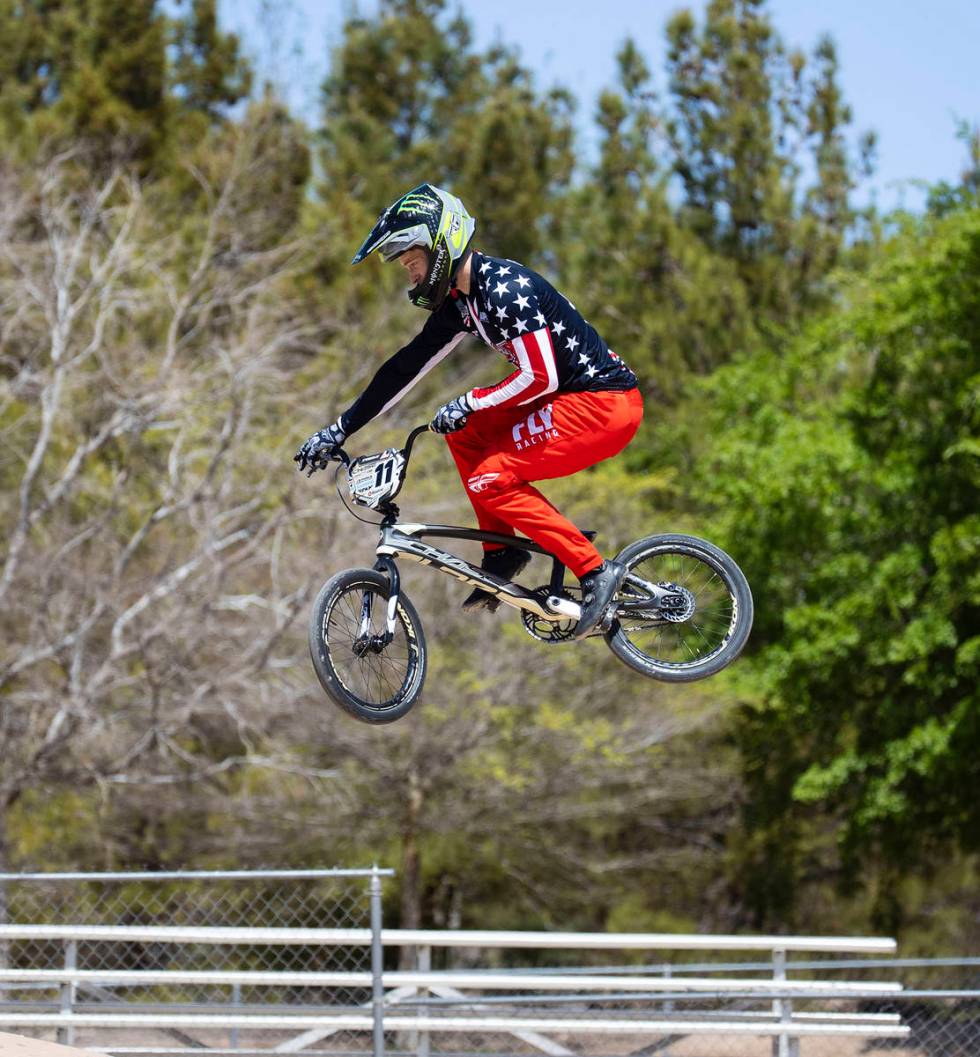
Staying motivated proves challenging amid lack of races
Connor Fields should have had it easy.
The BMX star was training to defend his Olympic gold medal when the lockdowns began. Bicycling, though, was one of the few outdoor activities experts were recommending at the time.
“Bike sales overall are through the roof over the last year, which is great,” says Fields, 28. “Unfortunately, just like with most things, the tracks and the races were put on hold during the thick of the pandemic, just because it was crowd-gathering.”
Most tracks, he says, are run by cities, so they had to follow the same guidelines as soccer fields and baseball diamonds. Every competition through last November was canceled early enough for him to schedule three months off.
“I looked at it as an opportunity to take a little bit of a break,” he says. “Outside of being injured and forced to take that much time off, I hadn’t been able to take that much time off since I started racing 20 years ago.”
Fields took advantage of the break to finish his degree in business management at UNLV. He tinkered with the mechanics of his bike, hiked and took up other ways of working out and staying fit. When he resumed training full time in July, he took it easy for a day, maybe a day and a half. After that, it was, as they say, just like riding a bike.
“I mean, you definitely feel a little rusty your first two, three times back riding again. And, more than anything, it’s just the timing and the visual processing of the jumps coming at you.”
The most difficult part of training during the pandemic, he found, was not having races on the calendar.
“Because then it was, like, what are you training for? I’m just exercising at this point,” Fields says. “When you’re training for an event or a goal, it’s really easy to motivate yourself to push as hard as you possibly can and go to that place where you’re getting 100 percent out of yourself. That was the hardest thing, just training for potential races that were maybe going to happen.”
If nothing else, the pandemic gave him a glimpse of his post-BMX life. He plans to take stock of things after Tokyo and determine whether to prolong his career. Two major decisions will weigh on his mind.
“If I still feel like I want to wake up at 7 in the morning and go and push myself to exhaustion six days a week,” he says. “If I wanna spend a hundred nights a year in a hotel room and take the risks of injury and physical wear and tear.”
“Having a bit of that time off was good in a way, to kind of see a preview of what life was going to be like afterward,” Fields adds, with one major exception. “It didn’t include a job, which I feel like is a pretty big part of a post-athletic career. You don’t just get to sit around and watch Netflix all day and work out.”
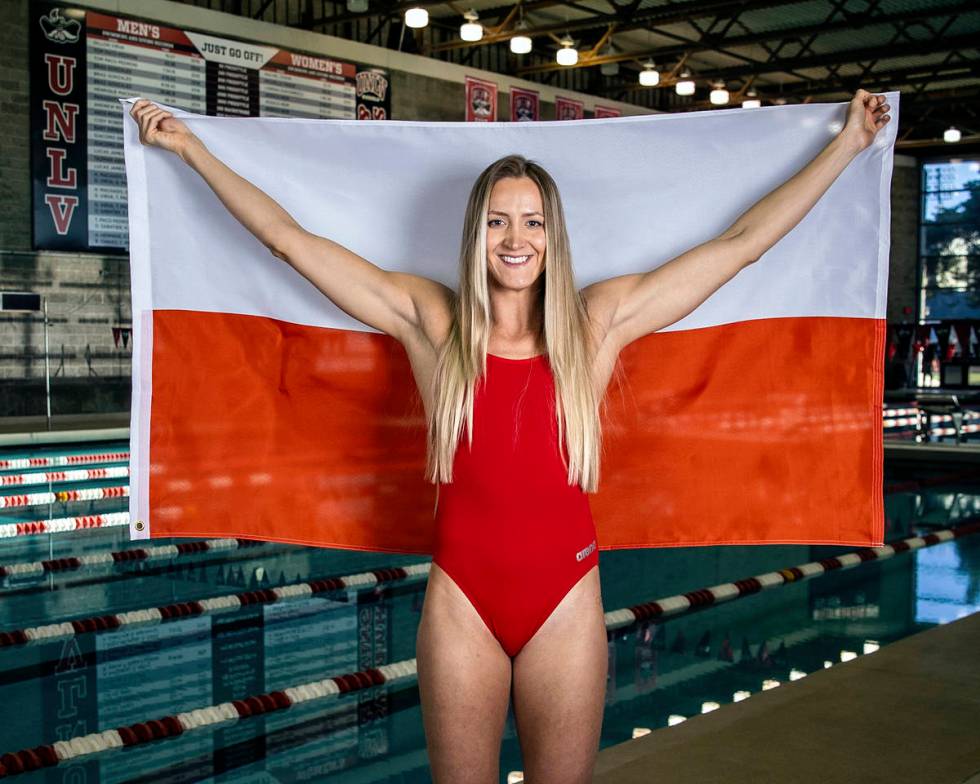
Polish swimmer remains positive — and ready
Kasia Wasick is accustomed to long layoffs.
After representing her native Poland at the 2008, 2012 and 2016 Olympics, she retired from swimming and moved to Las Vegas with her husband, Matthew. The retirement didn’t stick, though. In 2018, she started training with the UNLV swim team and volunteered as an assistant coach.
Having already stepped away from the sport, Wasick, 29, mostly took the pandemic-related delays in stride, reminding herself that things were out of her control.
“Pools were closed. The whole city was closed. That was really tough,” she says. But I always had the mindset of, ‘I’m going to be ready for the Olympics no matter what.’ ”
Wasick spent a lot of time hiking with her husband and climbed Mount Charleston Peak. She also focused on some of the technical aspects of her training.
“We always swim so much, but we don’t have time to get really deep into strength training, so I did that,” she recalls. “I focused on my mental preparation.”
Olympic-sized pools were off limits from the onset of lockdowns until June. To maintain the feel of the water, Wasick borrowed a friend’s backyard pool and swam attached to a bungee cord for resistance.
“Then, when we got (back) in the pool, we started full time,” Wasick says of her normal training grounds. “My coaches had no mercy.”
She’d already qualified for her fourth Olympics just before the pandemic. Wasick thought she was in great shape, just not good enough to have a chance at the podium. She somehow found a way to improve her times over the past year, though, and further lowered her marks last month during the European championships in Budapest, Hungary.
Now, she’s headed back to the international stage, thanks to having rediscovered her love of swimming here.
“Even though I’m going to be swimming for Poland,” Wasick says, “in my heart, I represent Las Vegas.”
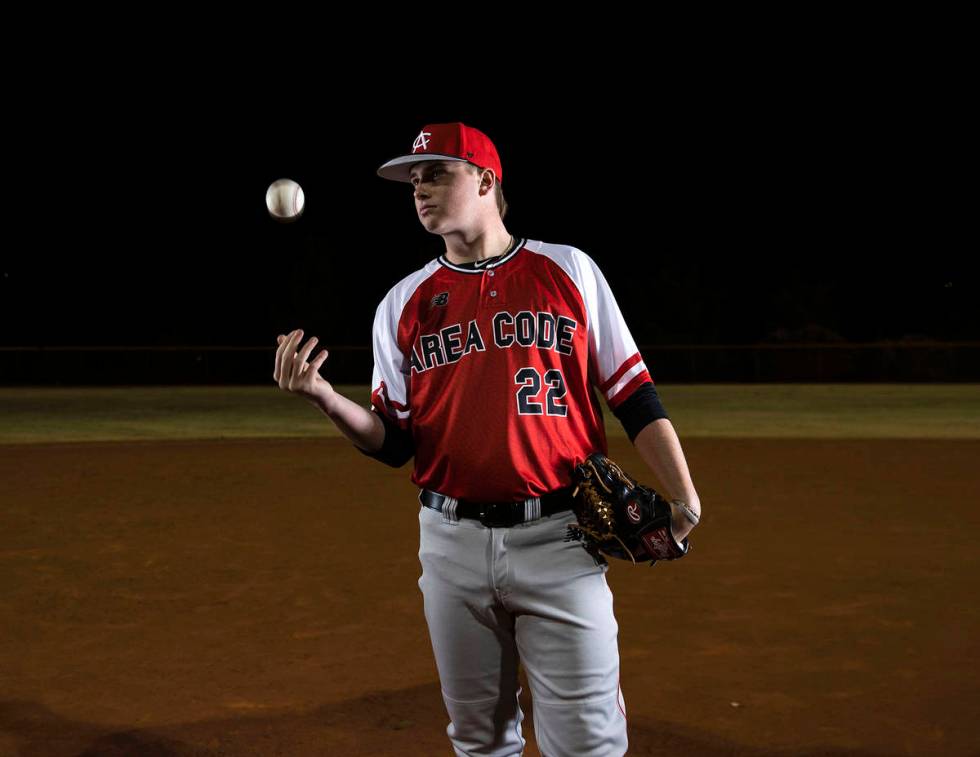
Thrown a curve, ace gets creative to hone his craft
Tanner McDougal was six games into his junior season at Silverado High School when the world shut down.
With every local baseball field closed, he relied on family members to help keep his pitching skills sharp. His grandfather, a welder, built a portable mound that McDougal kept in the snack shack at Anthem Hills Park, where his parents, Mike and Kristy, are officers in the Paseo Verde Little League. McDougal, now 18, used the contraption for the first three months of the pandemic, dragging it out whenever he needed a workout.
“I was able to just go out with no thought process and not have to think and just play,” he says. “Baseball gets incredibly tough when you have to think and try to play at the same time. It was almost like a privilege to go and throw a bullpen, because I got to get out of the house.”
The University of Oregon commit used the downtime to hit the gym in ways he wouldn’t have had time for during a regular school year. “I started working with a physical trainer, and I just got a lot stronger and a lot bigger and a lot faster.”
He also played on a traveling team and attended a couple of showcases, earning him more face time in front of scouts than he likely would have had just playing at Silverado. McDougal describes himself as being “super under the radar” before the pandemic. He emerged from it with an invite to the inaugural MLB Draft Combine, and he hopes to hear his name called during the draft in July.
McDougal credits at least some of that development to being able to work on his game in the relative anonymity of those sessions with his portable mound.
“I didn’t have to worry about all the scouts and all that stuff. I could just work and be better at my craft,” he says. “It was a luxury to have, and I’m glad that I had it.”



